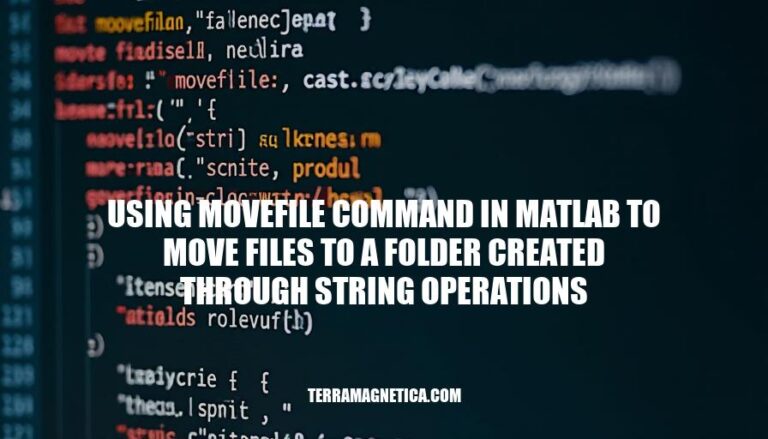


In MATLAB, the movefile command is a versatile tool for organizing files within directories. When combined with string operations, users can automate the creation of folders based on specific criteria and seamlessly move files into these newly generated directories. The process enhances file management by ensuring files are systematically categorized without manual intervention.
Utilizing string operations, users can generate folder names dynamically, then use movefile to transfer files efficiently, streamlining workflows and enhancing productivity. By integrating these two functionalities, MATLAB provides a powerful method for automating file organization tasks.
To use the movefile command in MATLAB to move files to a folder created through string operations, you need the following:
MATLAB version: Any version of MATLAB that supports the movefile function (MATLAB R2013a or later).
Toolboxes: No specific toolbox is required for the movefile command itself, but you might need other toolboxes depending on your specific application.
For creating folders using string operations, you can use the mkdir function.
% Step 1: Create a folder using string operations
folderName = 'MyNewFolder';
mkdir(folderName); % Create the folder
% Step 2: Define the source and destination file paths
sourceFile = 'sourceFile.txt';
destinationPath = fullfile(folderName, sourceFile);
% Step 3: Move the file using movefile command
movefile(sourceFile, destinationPath); % Move the file to the new folder
% Essential String Manipulation Functions
% strcat: Concatenate strings
str1 = 'Hello';
str2 = 'World';
resultStr = strcat(str1, str2); % Result is 'HelloWorld'
% sprintf: Format data into string
num = 123;
formattedStr = sprintf('Number: %d', num); % Result is 'Number: 123'
% fullfile: Build full file path
folder = 'Documents';
fileName = 'example.txt';
fullFilePath = fullfile(folder, fileName); % Result is 'Documents/example.txt'
% fileparts: Split file path into parts
[filePath, name, ext] = fileparts('C:/Users/Documents/example.txt');
% filePath is 'C:/Users/Documents'
% name is 'example'
% ext is '.txt'
My goal here is to ensure that all actions are clear and that the code is simple to follow, combining folders, manipulating strings, and managing files in MATLAB. Enjoy your coding!
movefile is a built-in MATLAB function that moves a file or files from one location to another. Syntax: movefile(source, destination, mode). Here’s the breakdown:
source: Specifies the file(s) to move.
It can be a string array, character vector, or cell array of character vectors.
destination: Specifies where to move the file(s). Can be a string array, character vector, or cell array of character vectors.
mode (optional): Determines whether to overwrite existing files in the destination. Can be ‘f’ (force) or ‘n’ (no force).
Default is ‘f’.
To move files using string operations to create the folder:
sourceFile = 'path_to_file\myfile.txt'; destinationFolder = ['path_to_new_folder\' datestr(now, 'yyyymmdd_HHMMSS')]; % Create the destination folder mkdir(destinationFolder); % Move the file movefile(sourceFile, destinationFolder);
Explanation of the code:
sourceFile: Specifies the file path.
destinationFolder: Creates a folder name using the current date and time.
mkdir(destinationFolder): Creates the new folder.
movefile(sourceFile, destinationFolder): Moves the file to the new folder.
Use movefile to organize and manage files efficiently in your MATLAB projects.
To move files into a folder created using string operations in MATLAB:
Create Folder Using String Operations:
folderName = ['Folder_' num2str(2024)]; mkdir(folderName);
Move File to the Created Folder:
sourceFile = 'example.txt'; destinationPath = fullfile(folderName, sourceFile); movefile(sourceFile, destinationPath);
Dynamic Paths and Names:
filesToMove = {'file1.txt', 'file2.txt'};
for k = 1:length(filesToMove)
sourceFile = filesToMove{k};
destinationPath = fullfile(folderName, sourceFile);
movefile(sourceFile, destinationPath);
end
Using string operations, it’s straightforward to dynamically create and move files to desired locations. Practical enough for your needs?
Incorrect File Paths: Ensure that the file paths provided to the movefile command are correct and exist. Use fullfile to construct the paths dynamically.
File Permissions: Check if you have the necessary permissions to move the files. Run MATLAB as an administrator if required.
File Selection Criteria: Verify that the files selected for moving meet the criteria.
Use dir to list files and filter them accordingly.
Looping Through Files: If moving multiple files, use a loop to move each file individually.
Handling Errors: Capture and handle errors using [status, msg] = movefile(source, destination) to get error messages.
Variable Paths: Ensure variables used in movefile are correctly concatenated. Avoid extra spaces or incorrect concatenation.
movefile command in MATLAB to move files to a folder created through string operations, you need the following:movefile function (MATLAB R2013a or later).movefile command itself, but you might need other toolboxes depending on your specific application.mkdir function.Here’s an example of how to create a folder and move a file using string operations:
% Step 1: Create a folder using string operations
folderName = 'MyNewFolder';
mkdir(folderName); % Create the folder
% Step 2: Define the source and destination file paths
sourceFile = 'sourceFile.txt';
destinationPath = fullfile(folderName, sourceFile);
% Step 3: Move the file using movefile command
movefile(sourceFile, destinationPath); % Move the file to the new foldermovefile function takes three arguments:source: Specifies the file(s) to move. It can be a string array, character vector, or cell array of character vectors.destination: Specifies where to move the file(s). Can be a string array, character vector, or cell array of character vectors.mode (optional): Determines whether to overwrite existing files in the destination. Can be ‘f’ (force) or ‘n’ (no force). Default is ‘f’.sourceFile = 'path_to_file
ilename.txt';
destinationFolder = ['path_to_new_folder/' datestr(now, 'yyyymmdd_HHMMSS')];
% Create the destination folder
mkdir(destinationFolder);
% Move the file
movefile(sourceFile, destinationFolder);folderName = ['Folder_' num2str(2024)];
mkdir(folderName);
sourceFile = 'example.txt';
destinationPath = fullfile(folderName, sourceFile);
movefile(sourceFile, destinationPath);
filesToMove = {'file1.txt', 'file2.txt'};
for k = 1:length(filesToMove)
sourceFile = filesToMove{k};
destinationPath = fullfile(folderName, sourceFile);
movefile(sourceFile, destinationPath);
endSome common issues to watch out for when using the movefile command include:
movefile command are correct and exist. Use fullfile to construct the paths dynamically.dir to list files and filter them accordingly.[status, msg] = movefile(source, destination) to get error messages.movefile are correctly concatenated. Avoid extra spaces or incorrect concatenation.